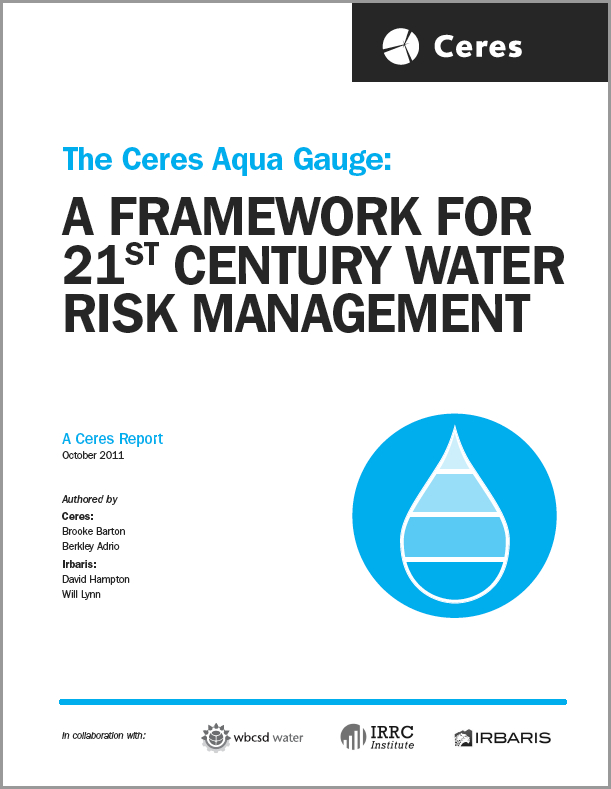Ceres Aqua Gauge: New Tool for Companies, Investors to Manage Risks of Worldwide Water Supply Pressures
Fills Investors' need to flag companies with biggest exposure; Helps companies elevate water risk in key strategic planning
Published 10-18-11
Submitted by Ceres

Against a backdrop of increasing business exposure to global water supply threats, Ceres today released a new tool for evaluating those risks – and opportunities – that both investors and companies can use as a roadmap to enhanced water stewardship.
“Water risks are urgent today and, given population and climate trends, can only grow increasingly more so,” said Ceres president Mindy Lubber, in announcing The Ceres Aqua Gauge: A Framework for 21st Century Water Risk Management. “Some companies are taking action to recognize and act on these risks, but many are not. The Aqua Gauge will help companies and investors take stronger, more comprehensive steps to manage this complex challenge.”
“Competing freshwater demands and supply limits are creating material risks to companies’ bottom lines and investment portfolios,” said Björn Stigson, president of the World Business Council on Sustainable Development, which worked closely with Ceres on the report. “Yet, communication between institutional investors and companies on water management has always been limited. Addressing this communication gap is what triggered the WBCSD to get involved in the Ceres Aqua Gauge.”
The report comes as water-related risks are intensifying around the world. In just the past year, unprecedented droughts have hit water-intensive companies and supply chains in Russia, China and across the southern tier of the U.S. Extreme floods have had severe economic impacts in Australia, Pakistan and the Midwestern United States. Numerous industries – apparel, beverage, food, agriculture and electric power – felt the financial ripples from these events, including:
- Gap Inc., dropping its annual profit forecast by 22 percent in the wake a record-setting drought that devastated Texas’ cotton crop, a major source of the company’s cotton.
- Gas producer Toreador saw its stock price plunge 20 percent recently after the French government banned the practice of shale-gas fracturing, primarily due to concerns over the process’s impact on water quality.
- Kraft, Sara Lee and Nestlé all announcing they will be raising food prices to offset higher commodity costs prompted by droughts, flooding and other factors.
Even as companies accelerate water efficiency and improved water resource management, water pressures are likely to worsen. According to estimates by McKinsey & Company, the world may face a 40 percent global shortfall between forecast water demand and available supplies by 2030.
Investors are keenly aware of this growing threat. More than 350 institutional investors backed a water survey sent this year to 408 of the world’s largest companies. More U.S. investors are filing shareholder resolutions asking for water-related disclosure from US companies, and prominent European institutional investors, including Norges Bank and Dutch asset manager Robeco, are integrating water considerations across their investment portfolios.
Yet, despite improved corporate water disclosure, it remains challenging for investors to understand how well companies are managing their water risks and capitalizing on opportunities.
The Aqua Gauge, developed with close input from 50 investors, companies and public interest groups, allows investors to score a company’s water management strategies against industry peers and detailed definitions of leading practice.
“The report gives institutional investors a powerful new tool to inform company dialogues by prioritizing key areas of corporate water management,” said Lara Yacob, senior engagement specialist of responsible investing at Robeco, a major asset management firm based in the Netherlands. "We take a long term view of investing in companies that manage their risks in order to protect shareholder value, and companies are increasingly facing risks around water management, whether from water scarcity, higher operation costs or higher raw material costs because of water price increases."
The report provides a step-by-step framework to help companies develop robust water strategies. The four key areas of activity are:
- Measurement: Is the company measuring and assessing risks related to its own water use and pollution? Is it assessing current and future risks to its water supply from climate change, rising costs, competing water users or regulation?
- Governance and Management: How involved is the board and senior management in overseeing water issues? How is water factored into capital investments and strategic decisions?
- Stakeholder Engagement: How is the company engaging on water with outside stakeholders such as local communities? Is the engagement focused on effective stewardship or trying to defend unsustainable practices?
- Transparency and Disclosure: Is the company clear and transparent on water-related activities and strategies? Is it disclosing information in ways that are meaningful and useful to investors?
Today’s report makes clear that some companies are already demonstrating leading practices, from Nestlé with its customized water risk mapping tool to Rio Tinto’s work to put a financial value on water used in its mining operations, to Coca-Cola’s requirement that all of its 900 bottling sites worldwide develop plans to protect and restore local water sources.
“These companies are positioning themselves for greater operational certainty, improved resource and market access and overall competitive advantage by moving ahead more aggressively on water management,” said Brooke Barton, report co-author who leads Ceres water program.
“This report reflects the most advanced thinking available on corporate water management – it’s a powerful new tool that can help business and investors navigate the complex world of water issues towards sustainable water use,” said Greg Koch, head of water stewardship at The Coca-Cola Company, a water-intensive company with 900 bottling plants in every corner of the world.
The report is a collaboration between Ceres and the World Business Council for Sustainable Development, the investor research organization IRRC Institute, and UK-based consultancy Irbaris.
“It’s old news that water presents risk and opportunity,” said Jon Lukomnik, executive director of the IRRC Institute. "What is new and useful is that for the first time investors can measure how corporations are responding. The IRRC Institute funded this project because it provides a market-based solution to a market and environmental issue."
The full report and Aqua Gauge tool are available for download at www.ceres.org/aquagauge.
About the Report Partners
Ceres is a U.S.-based coalition of investors, environmental groups, and other public interest organizations working with companies to address sustainability challenges such as climate change and water scarcity. Ceres directs the Investor Network on Climate Risk, a group of more than 100 U.S. and European institutional investors and financial firms that collectively manage over $10 trillion in assets. www.ceres.org
The World Business Council for Sustainable Development (WBCSD) is a CEO-led, global association of some 200 companies dealing exclusively with business and sustainable development. www.wbcsd.org
Irbaris is a specialist consulting firm focused on helping clients understand and respond to the strategic impacts of environmental sustainability. Irbaris works internationally with major companies, investors and government agencies. www.irbaris.com
The IRRC Institute is a not-for-profit organization headquartered in New York, NY that provides thought leadership at the intersection of corporate responsibility and the informational needs of investors. www.irrcinstitute.org

Ceres
Ceres
Our Mission: Ceres is transforming the economy to build a just and sustainable future for people and the planet.
Ceres is a nonprofit organization working with the most influential capital market leaders to solve the world’s greatest sustainability challenges. Through our powerful networks and global collaborations of investors, companies, and nonprofits, we drive action and inspire equitable market-based and policy solutions throughout the economy to build a just and sustainable future. For more information, visit ceres.org and follow @CeresNews.
More from Ceres

